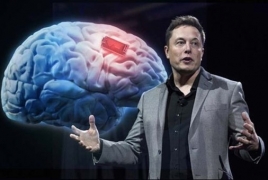Musk unveils plans for brain-reading "threads" July 17, 2019 - 12:29 AMT PanARMENIAN.Net - Elon Musk’s Neuralink, the secretive company developing brain-machine interfaces, showed off some of the technology it has been developing to the public for the first time. The goal is to eventually begin implanting devices in paralyzed humans, allowing them to control phones or computers. The first big advance is flexible “threads”, which are less likely to damage the brain than the materials currently used in brain-machine interfaces, The Verge says. These threads also create the possibility of transferring a higher volume of data, according to a white paper credited to “Elon Musk & Neuralink.” The abstract notes that the system could include “as many as 3,072 electrodes per array distributed across 96 threads.” The threads are 4 to 6 μm in width, which makes them considerably thinner than a human hair. In addition to developing the threads, Neuralink’s other big advance is a machine that automatically embeds them. Musk gave a big presentation of Neuralink’s research Tuesday night, though he said that it wasn’t simply for hype. “The main reason for doing this presentation is recruiting,” Musk said, asking people to go apply to work there. Max Hodak, president of Neuralink, also came on stage and admitted that he wasn’t originally sure “this technology was a good idea,” but that Musk convinced him it would be possible. In the future, scientists from Neuralink hope to use a laser beam to get through the skull, rather than drilling holes, they said in interviews with The New York Times. Early experiments will be done with neuroscientists at Stanford University, according to that report. “We hope to have this in a human patient by the end of next year,” Musk said. During a Q&A at the end of the presentation, Musk revealed results that the rest of the team hadn’t realized he would: “A monkey has been able to control a computer with its brain.” Yerevan will host the 2024 edition of the World Congress On Information Technology (WCIT). Rustam Badasyan said due to the lack of such regulation, the state budget is deprived of VAT revenues. Krisp’s smart noise suppression tech silences ambient sounds and isolates your voice for calls. Gurgen Khachatryan claimed that the "illegalities have been taking place in 2020." Partner news |